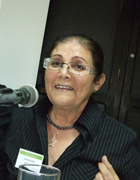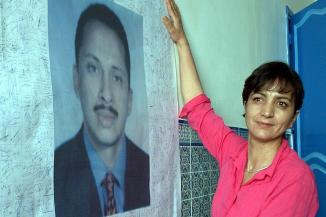 “While Tunisia has a long history of promoting women’s rights since they were enshrined in the Constitution in 1959, during the reign of President Habib Bourguiba, they have not been upheld by the current President Zine El Abidine Ben Ali, who came to power in November 1987.
“While Tunisia has a long history of promoting women’s rights since they were enshrined in the Constitution in 1959, during the reign of President Habib Bourguiba, they have not been upheld by the current President Zine El Abidine Ben Ali, who came to power in November 1987.
We are concerned by the on-going violations of women’s rights, as highlighted by the following examples. Since December 2008, pro-government newspapers and websites have increasingly targeted well-known critical journalists, human rights defenders and their relatives with ongoing defamation and insult campaigns, which are particularly degrading to women. The smear campaigns include the portrayal of women in government-backed newspapers and websites as “sexual perverts,” “prostitutes,” and “traitors on the payroll of foreign governments or groups.” Slanderous articles are published, often on a daily basis, targeting particular women. The government has also orchestrated the distribution of fabricated videocassettes and DVDs that aim to humiliate these women.
Attacks against journalists
The women targeted in the pro-government media include journalist Sihem Bensedrine (picture on the right) and Naziha Réjiba (also known as Um Ziad) (picture below) of IFEX member Observatoire de la Liberté de la Presse, de L’Edition et de la Création (OLPEC). Bensedrine is routinely referred to in the government media as a “prostitute” who has collected over a million Euros from donors for personal use. Since early 2009, she has been beaten and searched several times when crossing the border into Tunisia, and was tortured in pri son in 2000 and 2001. Réjiba has been targeted with attacks for over twenty years, since she began publishing critical articles about Ben Ali. The two women also run the independent online news journal “Kalima”, which is blocked in Tunisia. Their homes and phone lines are monitored and they are constantly followed by plainclothes police.
son in 2000 and 2001. Réjiba has been targeted with attacks for over twenty years, since she began publishing critical articles about Ben Ali. The two women also run the independent online news journal “Kalima”, which is blocked in Tunisia. Their homes and phone lines are monitored and they are constantly followed by plainclothes police.
Smear tactics are part of the endless cycle of harassment, which has escalated since the election in October. The insults took a more sinister turn in December 2009, when these media started accusing journalists and activists of being “agents of Israel,” and called for them to be publicly lynched.
Many of those constantly targeted, including Bensedrine, Réjiba and Radhia Nasraoui (picture below), who is a lawyer, human rights activist and president of the Tunisian Association for Combating Torture in Tunisia, issued a public statement in July 2009 accusing the Ministry of the Interior of being behind these smear campaigns. Legal complaints in many cases have been lodged against these media, with no results.
the Tunisian Association for Combating Torture in Tunisia, issued a public statement in July 2009 accusing the Ministry of the Interior of being behind these smear campaigns. Legal complaints in many cases have been lodged against these media, with no results.
Smear campaigns
One of the ugliest smear campaigns was launched in June 2009 against human rights lawyer and former political prisoner Mohamed Abbou and his wife Samia (picture below), a rights defender. During Abbou’s imprisonment from March 2005 to July 2007, his wife and children were harassed by police. Samia Abbou has been followed by undercover agents since her husband was detained, and has been subjected to  beatings and insults. Their family home remains under regular police surveillance, even when Mohamed Abbou is travelling. Samia Abbou and rights activist Fatma Ksila were beaten by police in February 2008.
beatings and insults. Their family home remains under regular police surveillance, even when Mohamed Abbou is travelling. Samia Abbou and rights activist Fatma Ksila were beaten by police in February 2008.
The state-run Tunisian Agency for External Communication is a party to defamation by allowing slanderous public advertisements in newspapers like “Al Hadath”, and websites that specialise in insulting the government’s critics.
Vocal women are routinely subjected to persecution designed to deter them from carrying out their work. Journalist Faten Hamdi of Radio Kalima was struck in the face by police officers when she was interviewing a female student in February 2010. Hamdi managed to get away from them, but the female interviewee was taken to the police station before being released. Hamdi was also assaulted by police in November 2008, and was threatened with imprisonment during the police siege of “Kalima” in early 2009.
Blogger Fatma Riahi (who blogs under the name Fatma Arabbica) (picture on the right) has also been arrested and targeted by the police; she was also held incommunicado in November 2009. Her blog, like other critical blogs, has been censored.
Among women lawyers, Nasraoui has been subject to travel restrictions and ongoing harassment, including having her home surrounded by police. Other women lawyers have also been mistreated, such as Imen Triki, who was physically and verbally abused by police while defending a client. Women judges, including members of the Association des Magistrats Tunisiens, who attempt to act independently from government, are tightly controlled and moved to remote places away from their families as a means of punishing them into silence.
Women who work for the Association tunisienne des femmes démocrates (ATFD) also face routine harassment, including its president Sana Ben Achour, who has been defamed in the media since the elections in October, when the ATFD participated in media monitoring. ATFD and OLPEC report that during the elections, women legislative candidates were very poorly represented in the state-run media – gaining less than one percent visibility in media coverage.
Arrests of Academics
Academics have also been targeted. Prof. Khedija Cherif, a sociologist at the University of Tunis and a prominent advocate of women’s rights, has been the victim of recent smear campaigns as well as physically and verbally harassed. Academic and activist Zakia Dhifaoui spent three months in jail after being arrested during a peaceful protest in Gafsa in July 2008. Ghazela M’Hamdi, a rights activist in Gafsa, has also been beaten by police while exercising her right to protest peacefully.
Afef Ben Nasser is routinely verbally harassed by police in Gafsa, who also broke into her store in 2009. Ben Nasser is the wife of journalist Fahem Baoukaddous, currently facing a four-year prison term for reporting on protests in Gafsa. Family members of other journalists sentenced to prison have also been targeted by the police, including Azza Zarrad, wife of jailed journalist Toufik Ben Brik, who is critically ill. While lobbying for his release in Tunisia, she has been verbally assaulted by police.
Tunisia Monitoring Groups’s members have repeatedly expressed their disappointment at the abhorrent tactics used against government critics, particularly noting that the attacks on women activists and journalists bring shame upon a government claiming to be at the forefront of promoting women’s rights in the region.
TMG calls UN
We are also concerned by evidence of impunity for perpetrators of crimes against women in Tunisia, as demonstrated in the case of  Khaled Ben Saïd, former Tunisian Vice-Consul in France. In 2008, a court in Strasbourg, France sentenced Ben Saïd to eight years in prison for his role in torturing a woman in prison in Tunisia in 1996. The woman, while living in exile in France, had recognised him as the former chief of police in Jendouba. Ben Saïd fled to Tunisia when the case was lodged and now works for the government. Tunisian authorities rejected the case against him as “unfounded”.
Khaled Ben Saïd, former Tunisian Vice-Consul in France. In 2008, a court in Strasbourg, France sentenced Ben Saïd to eight years in prison for his role in torturing a woman in prison in Tunisia in 1996. The woman, while living in exile in France, had recognised him as the former chief of police in Jendouba. Ben Saïd fled to Tunisia when the case was lodged and now works for the government. Tunisian authorities rejected the case against him as “unfounded”.
We call on the United Nations to take concrete steps to address these issues with the Tunisian authorities, including raising these violations during official visits and requesting missions by relevant special rapporteurs to take up the cases where the rights of women and freedom of expression to Tunisia have been violated.”
Members of the Tunisia Monitoring Group:
Arabic Network for Human Rights Information, Egypt
ARTICLE 19, UK
Bahrain Center for Human Rights
Cairo Institute for Human Rights Studies, Egypt
Canadian Journalists for Free Expression
Cartoonists Rights Network International
Egyptian Organisation for Human Rights
Index on Censorship, UK
International Federation of Journalists
International Federation of Library Association and Institutions
International PEN – Writers in Prison Committee, UK
International Press Institute, Austria
International Publishers’ Association, Switzerland
Journaliste en Danger, Democratic Republic of Congo
Maharat Foundation, Lebanon
Media Institute of Southern Africa, Namibia
Norwegian PEN
World Association of Newspapers and News Publishers, France
World Press Freedom Committee, USA
World Association of Community Radio Broadcasters
Members of the IFEX Gender Working Group:
Center for Media Studies & Peace Building, Liberia
Center for Journalism and Public Ethics, Mexico
Centro de Reportes Informativos sobre Guatemala
Cartoonists Rights Network International
International Federation of Journalists
Media Institute of Southern Africa, Namibia
Norwegian PEN
Pacific Freedom Forum
The letter was also addressed to:
Ms. Hina Jilani, Special Representative of the UN Secretary-General on the Situation of Human Rights Defenders
Special Procedures Division – Human Rights Defenders
Office of the UN High Commissioner for Human Rights Geneva, Switzerland
Ms. Melanne Verveer, US Ambassador at large for women’s rights
Ms. Hilary Clinton, US Secretary of State
Ms. Catherine Ashton, High Representative of the European Union for Foreign Affairs and Security Policy
Ms. Bebia Bouhnak Chi, Minister of Women and Family Affairs, Tunisia





